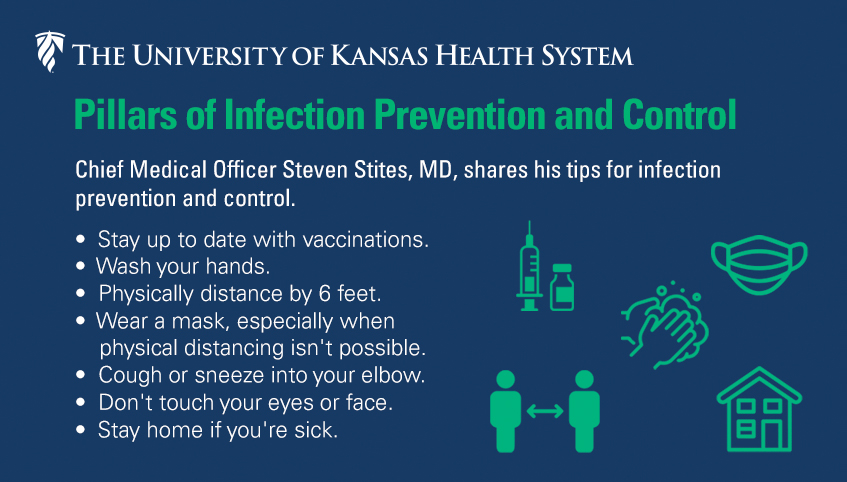November 20, 2020
"It's irresponsible behavior, and it needs to stop," says Joseph LeMaster, MD, MPH.
That's what one physician and public health officer says of the highly concerning concept of so-called COVID-19 parties. At these gatherings, attendees deliberately seek to become infected with SARS-CoV-2, the virus that causes COVID-19, in an attempt to achieve herd immunity, in which a large part of a population becomes immune to an infectious disease due to vaccination or prior illness.
Doctors say, however, that this won’t work, and is highly dangerous to boot.
"The best example of herd immunity is chicken pox," says Dana Hawkinson, MD, director of infectious disease prevention and control for the health system. "We have a vaccine for it, and, with generation after generation of children having gotten chicken pox, we know the disease. We know that, especially in the pediatric population, it tends to be mild. There is no such science or validated data on achieving herd immunity for COVID-19."
For starters, COVID-19 affects different people in different ways. For many, the virus causes only mild symptoms – like a low-grade fever, loss of taste or smell or mild sniffles or cough. Many others are asymptomatic, meaning they are infected with the virus but experience no symptoms at all. For others – more than 1.3 million people worldwide and counting – COVID-19 proves fatal. Many who have died of the disease were older or had existing, underlying health conditions. Others, however, were younger and previously healthy, yet still could not survive this unpredictable illness. Still others survive COVID-19, but face resulting heart or lung problems that reduce long-term quality of life.
The prospect of getting to herd immunity through natural infection and going out and actively trying to get the virus is an extremely bad idea. – Dana Hawkinson, MD
Director, Infectious disease prevention and control
Doctors also are learning that people can be infected and reinfected within the same year, with the second infection sometimes following the first by as little as 60 days. And some of those reports indicate the second illness is often more symptomatic and more severe.
"We don't understand exactly what's going to happen when you get reinfected," Dr. Hawkinson says. "The prospect of getting to herd immunity through natural infection and going out and actively trying to get the virus is an extremely bad idea."
To achieve herd immunity, the majority of the population must have had COVID-19 and develop antibodies in their blood or have received a vaccine. To date, less than 10% of the population has contracted the virus. And, with studies showing that antibody counts decrease 90 or more days after infection, it's clear we’re a long, long way from herd immunity. To proceed on this deliberate path toward it, "the death count would be untold," says Steve Stites, MD, chief medical officer for the health system.
Why take chances on your health or your life, and those of friends or loved ones, when practicing the pillars of infection prevention and control will keep you safe and healthy until a vaccine is available?

What's more, the concept of COVID-19 parties presents tremendous risk to many more people than those who attend the gatherings. The impact the increasing number of severe COVID-19 cases has on hospitals and healthcare workers is significant.
Our own hospital in Kansas City, Kansas, admitted our first COVID-19 patient in March. In the following months, the inpatient count rose and fell, often hovering in the 30s. Mid-November brought an alarming rise, with our COVID-19 inpatient count in the 60s, 70s, 80s and even 90s. That means more hospital beds are filled with people fighting COVID-19. More healthcare workers are devoted to COVID-19 care. More personal protective equipment (PPE) is needed to keep those workers safe.
It's not just the COVID patients who suffer. If you have a heart attack or a stroke, where are you going to go? If you’re in a car accident and you have serious trauma, where are you going to go? If the hospitals are overwhelmed, where are you going to go? That’s the choice you face. – Steve Stites, MD
Chief medical officer
The strain on the health system and its workforce increases. We have fewer resources available for additional COVID-19 patients. We have fewer resources available for people with other conditions – heart attacks, strokes or traumatic injuries. We can't accept as many patient transfers. (We're receiving transfer requests from Arkansas, Colorado, Iowa, Missouri, Oklahoma and Nebraska – where local hospitals may not have beds. In April, we had to turn down about 40 requested transfers. In October, we had to turn down 140). We have fewer resources available for elective or nonurgent surgeries and procedures. Those begin to be delayed. It's a frightening and unsustainable pattern.
"It's not just the COVID patients who suffer," says Dr. Stites. "If you have a heart attack or a stroke, where are you going to go? If you're in a car accident and you have serious trauma, where are you going to go? If the hospitals are overwhelmed, where are you going to go? That’s the choice you face."
Herd immunity isn’t the answer, agrees Allen Greiner, MD, MPH, professor and vice chair of family medicine and community health for the University of Kansas Medical Center.
"We have to change our behavior now," he says. "And we have to have new therapeutics and a vaccine, hopefully soon."
We want to be available for you when you need us, whatever you need us for. We want to be available to your loved ones and friends. Please help us. Put an immediate stop to so-called COVID-19 parties.
Wash your hands. Avoid gatherings. Practice physical distancing. Stay strong and stay healthy. Help us fight COVID-19 – safely.




